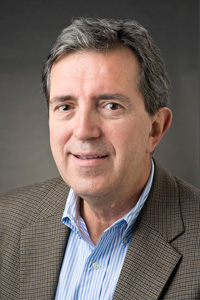 Tim Smeeding has dedicated his career to studying poverty and economic inequality. While directing UW-Madison’s Institute for Research on Poverty from 2008 to 2014, he spearheaded the Wisconsin Poverty Report, which provides county-level information about economic well-being across the state.
Tim Smeeding has dedicated his career to studying poverty and economic inequality. While directing UW-Madison’s Institute for Research on Poverty from 2008 to 2014, he spearheaded the Wisconsin Poverty Report, which provides county-level information about economic well-being across the state.
Smeeding has been named the 2017 John Kenneth Galbraith Fellow with the American Academy of Political and Social Science, a high honor. Past fellows include UW-Madison Chancellor Becky Blank as well as the late U.S. Sen. Daniel Patrick Moynihan, with whom Smeeding and professor Lee Rainwater co-authored The Future of the Family in 2004.
What brought you to UW-Madison for your master’s and doctorate in economics, and later to join the La Follette School and head the Institute for Research on Poverty?
I have always been interested in solutions to social problem like poverty and excessive inequality. The economics department at UW-Madison in the 1970s and the Institute for Research on Poverty, where I was a research assistant, were the best places in America to do that research. I was very lucky to be able to study with Bob Haveman, Robert Lampman and many others. When I was contacted in 2007 about my interest in joining the La Follette School and becoming the director of IRP, I jumped at the chance.
Why do you look at inequalities in income, consumption and wealth?
Income inequality is the usual metric for measuring one’s economic status in society. But economists prefer consumption as a measure of well-being. Most importantly, accumulated wealth provides insurance for both income and consumption. To really understand inequality, poverty and upward mobility, we need all three dimensions of economic status for the same households over an extended period of time. We call this “Inequality in 3D.”
How would you summarize your most recent research and work?
With several other leading scholars, I am trying very hard to introduce a new universal child allowance program in the United States, similar to that found in Europe and Canada, to put a floor under poor children’s family incomes and reduce volatility, severe poverty and extreme deprivation.
What are the biggest barriers to eliminating poverty in Wisconsin? Is what you find here different from elsewhere in the country, or other countries?
Wisconsin faces several challenges that are common to Midwestern states, which formerly had a lot of high-wage manufacturing and construction jobs that were lost since 2000, and especially during in the Great Recession. The answer to poverty is a good steady job that pays high enough wages to support one’s family. We don’t have enough of these jobs in Wisconsin, so we need to supplement wages with safety net benefits to keep people from poverty.
Last January, the Wisconsin Alumni Research Foundation appointed you as the Lee Rainwater Distinguished Professor of Public Affairs and Economics. What impact has that appointment and support had on your work?
I was honored to be recognized by my peers for the quality of my 40-plus years of research. The award allowed me to name my professorship after Lee Rainwater, my co-author, friend and advisor for over 30 years. Thanks to Lee, we built the cross-national data and policy resource called the Luxembourg Income Study on which I based much of my most important research and which allows many other scholars to use the same data to analyze poverty, inequality and social policy across more than 50 nations.
Why have you chosen to stay at UW-Madison?
I don’t know how I could better spend my time than with the wonderful colleagues, friends and opportunities to contribute that I find here in Madison. Both my spouse, Marcy Carlson, who is professor of sociology and director of the Center for Demography and Ecology, and I love our life in Madison. We are here for the long haul because we want to be here, and we strongly believe in the mission and values of this great university. The belief that I can still make a difference in the lives of my students, colleagues and those who are in need keeps me going. That is what the Wisconsin Idea is about and that is what I hope to continue to do for the foreseeable future.

